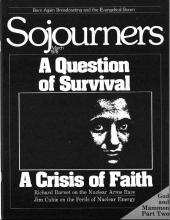"If I had been a journalist at the time of the crucifixion, I would have been hanging around Herod's palace talking to Pilate and disregarding [Jesus]."
Out of the deluge of words spoken at the National Religious Broadcasters' convention in Washington, D.C. in January 1978, this statement by Malcolm Muggeridge stood out. First, it had immediate personal relevance to this reporter: I was so busy chasing down celebrity Christians for interviews that if Jesus Christ had walked in, I certainly would have rushed by the out-of-place character.
On second thought, the words of the 75-year-old Britisher seemed to apply to more than the journalists or broadcasters at the evangelical extravaganza. At the time of the crucifixion, most Americans would have focused their attention on Herod, Pilate, their armies, their courts, and their rationales for doing what was "necessary" for law and order. Or for morality and family. Or for keeping the economy on an even keel. Or for the integrity and stability of the empire.
Most us of would have done it then, because we do it today. As good American citizens, and as reporters and as consumers of the news, we wittingly and unwittingly tag along with the crucifiers. We are fascinated with power.
The fascination with power carries over from our secular life to our religious life. Come Easter and the resurrection, we feel quite comfortable glorifying God the almighty, the omnipotent. We forget where we were three days earlier. We neglect our complicity in the cross event. And in the process, we ravel the whole fabric of Holy Week.
Read the Full Article

